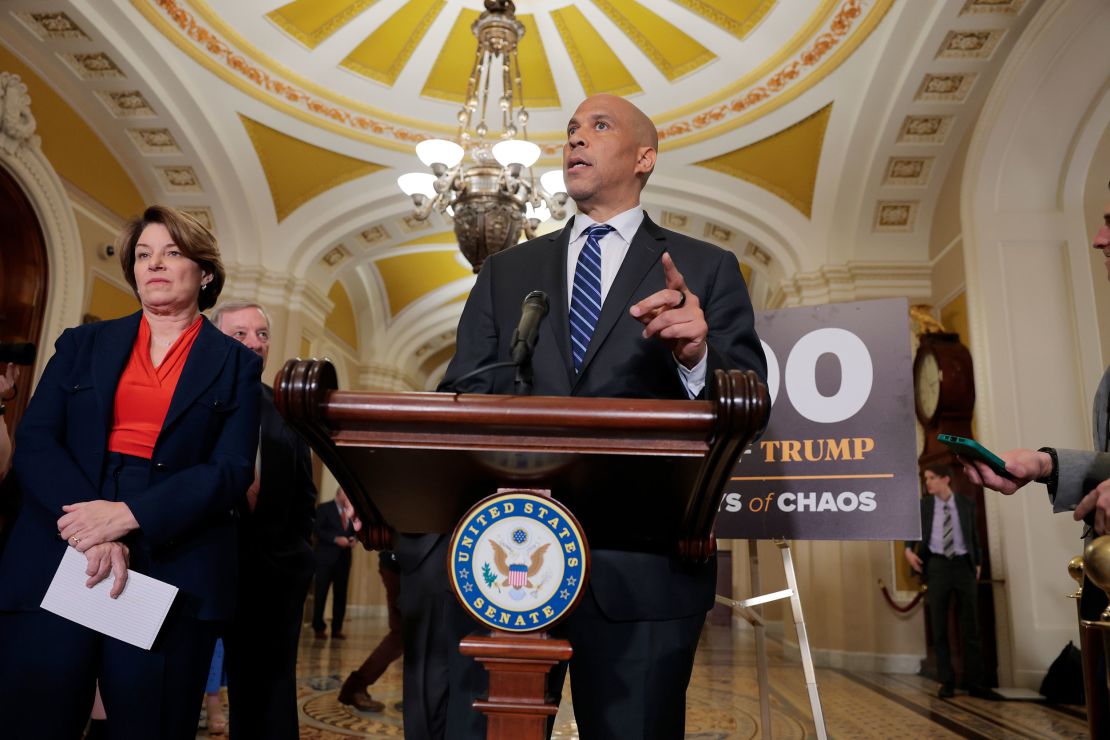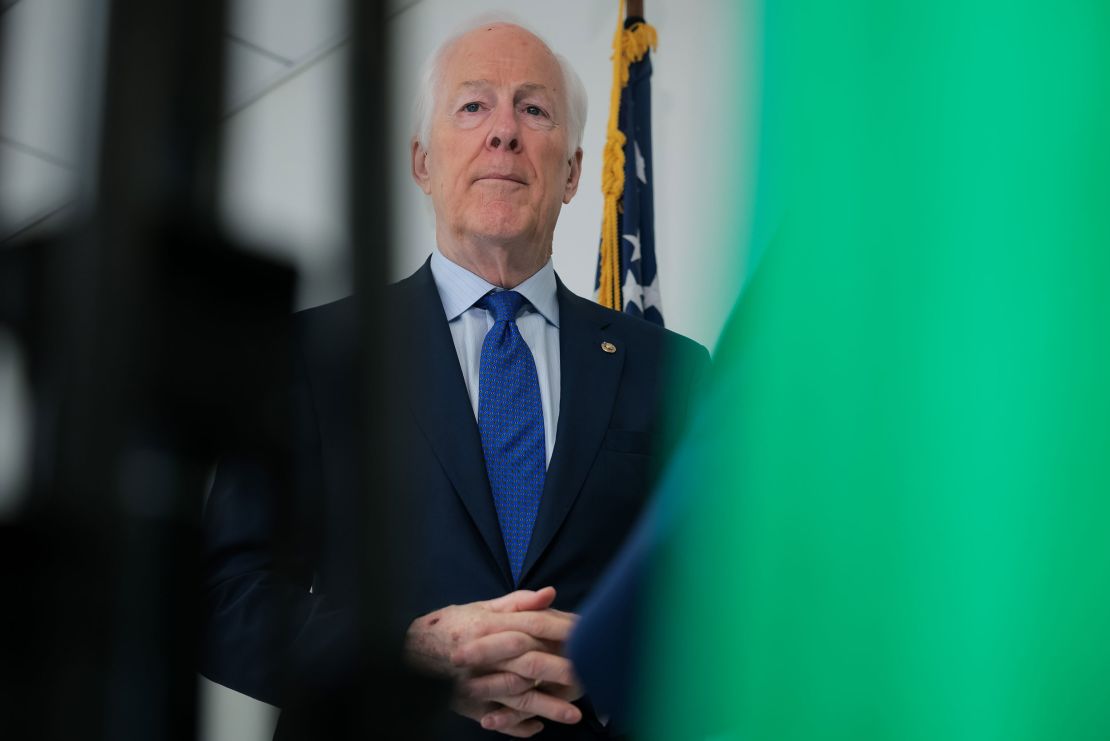CNN
—
The most vulnerable House Republicans on the ballot next year are building significant stores of cash as they prepare to defend the GOP’s slender majority in Congress.
And years before the first presidential primary votes are cast, some potential White House contenders are showing early fundraising strength.
Here are several key takeaways from campaign finance reports filed at Tuesday’s quarterly deadline with the Federal Election Commission.
New Jersey Sen. Cory Booker is up for reelection next year in a safely blue state. But he still raised nearly $10 million through his campaign and an affiliated committee between April 1 and the end of June, a period that began with his record-breaking Senate floor speech. He entered July with a massive $19.6 million in his Senate campaign account. That money could be transferred to a future White House campaign committee.

Another potential contender for the Democratic presidential nomination, California Rep. Ro Khanna, raised nearly $2.5 million in the three-month period and had $14.2 million in his House campaign account.
New York Rep. Alexandria Ocasio-Cortez followed up a record-breaking first quarter in which she hauled in $9.6 million with another strong fundraising period, bringing in $5.8 million in the second quarter. More than 70% of the money she raised in the April-to-June period came in amounts of $200 or smaller. The four-term congresswoman reported nearly $10 million in available cash.
Connecticut Sen. Chris Murphy raised $2.3 million between April and June despite not facing reelection to the Senate until 2030. And Murphy’s quarterly report showed he had more than $10 million at the end of the period.
And Arizona Sen. Ruben Gallego, a Democrat first elected to the Senate last year and already making visits to early primary states and battlegrounds, raised about $780,000 in the second quarter and had about $885,000 remaining in his campaign account.
Four out of the seven Republicans now seeking reelection in districts rated as tossups by “Inside Elections with Nathan Gonzales” each raised $1 million during the second quarter. And all seven had stockpiled at least $1 million in their campaign accounts at the end of June, led by New York Rep. Mike Lawler with $2.2 million.
Lawler, whose Hudson Valley district is among the most competitive in the country, will need the funds if he decides to keep pursuing reelection.
He’s also weighing a challenge to New York’s Democratic Gov. Kathy Hochul, although President Donald Trump has made clear he would prefer the two-term congressman remain in the narrowly divided House rather than risk losing a GOP seat.
GOP Rep. Mariannette Miller-Meeks, reelected in her Iowa swing district by fewer than 800 votes last year, had nearly $2.1 million remaining in her election account.
Georgia Sen. Jon Ossoff, one of the Senate’s most prolific fundraisers and the only Democratic incumbent in the chamber seeking reelection next year in a state Trump carried, raised $10 million in the quarter. He had more than $15 million remaining in his campaign coffers.
The race for the Republican nomination is still taking shape. US Rep. Buddy Carter, who entered the race in May, reported total receipts of $3 million. But that included a personal loan of $2 million Carter gave himself at the end of June.
In Maine, Sen. Susan Collins, the lone Republican incumbent seeking reelection in a state that former Vice President Kamala Harris won last year, brought in more than $2.4 million, exceeding the roughly $842,000 she collected in the first three months of the year. Collins started July with more than $5.2 million stockpiled for her reelection battle.
Jordan Wood, a former congressional aide who is seeking the Democratic nomination in Maine, reported $1.6 million in second-quarter receipts, including a $250,000 loan to his campaign. But many in the party are awaiting word from Maine’s term-limited Democratic Gov. Janet Mills on whether she will seek to take on Collins.
The Democrats’ already uphill battle to flip the Senate from Republican control next year is made harder as they defend several open seats.
In the crowded primary contest to succeed retiring Michigan Sen. Gary Peters, state Sen. Mallory McMorrow had the strongest second-quarter fundraising, bringing in $2.1 million.
Another Democrat, Rep. Haley Stevens, reported higher total receipts – $2.8 million – but that included $1.5 million from her House campaign account in the form of transferred funds and in-kind contributions. Former Wayne County health official Abdul El-Sayed, meanwhile, raised $1.8 million. Former state House Speaker Joe Tate lagged behind at about $193,000.
In Minnesota, Rep. Angie Craig, who represents a battleground House district, outraised Lt. Gov. Peggy Flanagan, boosted in part by funds from her House campaign account. Craig and Flanagan are competing in the Democratic primary to replace retiring Sen. Tina Smith.
And in New Hampshire, where Sen. Jeanne Shaheen is retiring, Democratic Rep. Chris Pappas raised $1.8 million and had about $2 million in available funds. Former Massachusetts Sen. Scott Brown, a top Republican recruit, entered the race at the end of June, just days before the end of the second-quarter fundraising period.
Iowa Sen. Joni Ernst brought in about $723,000 in the second quarter. That’s a dip from the $1 million she collected in the first three months of the year and is likely to fuel further speculation that the two-term senator could opt to retire.
Ernst entered July with roughly $3.4 million in her campaign coffers.
Ernst faced sharp criticism from the president’s allies over her initial concerns about his pick for defense secretary, Pete Hegseth. She also created a viral moment for Democrats in Iowa and nationally at a town hall where someone pressing her about GOP-enacted Medicaid cuts said people would die as a result.
“Well, we all are going to die,” Ernst replied.

One of the most hotly contested GOP primary battles of the midterms is unfolding in deep-red Texas. Four-term Sen. John Cornyn started the month with an early financial advantage over his primary challenger, Attorney General Ken Paxton.
Cornyn had amassed nearly $6 million in cash reserves in his main Senate campaign account, surpassing the $2.5 million that Paxton had remaining in his.
Rep. Wesley Hunt, a Trump ally who has signaled he might join the contest, raised nearly half a million dollars during the second quarter and started July with $3 million in available cash.
Democrats looking to this fall’s off-year elections see promising signs in Virginia, where Democrat Abigail Spanberger is dominating her GOP rival, Lt. Gov. Winsome Earle-Sears, in fundraising as they battle to become the state’s next governor.
Spanberger raised $10.7 million during the second quarter, swamping the $5.9 million reported by Earle-Sears.
With the help of outside groups, Democrats are outspending Republicans on advertising in Virginia by about $13 million to $3 million, according to data from the ad tracking firm AdImpact.
One test of Trump’s influence will play out in Kentucky. Republican Rep. Thomas Massie has faced Trump’s ire over his refusal to back the president’s landmark policy law. Massie, who already is the target of a million-dollar ad campaign by a Trump-linked outside group, raised $586,000 between the beginning of April and the end of June.
That was more than his haul of $445,000 in the first quarter of the year, and up significantly from the $55,000 that Massie raised in the second quarter of 2023, the same period in the last election cycle. His campaign touted an influx of new donors, saying 68% of the contributors during the three-month period were first-time givers.
Among the notable Massie donors were Rory Gates, the son of billionaire philanthropists Bill and Melinda Gates, who gave a maximum donation of $7,000, and former GOP congressman Justin Amash, who contributed $3,500.
Entering July, Massie had amassed more than $1.7 million.
Rep. LaMonica McIver, a New Jersey Democrat, drew national attention when she was arrested during a confrontation with immigration officers at a detention center in May. She brought in more than $750,000 between April 1 and the end of June, the new filings show. McIver, first elected in a special election last September, had raised only $65,000 in the first three months of the year.
The campaigns of the top Democrat in the House, New York Rep. Hakeem Jeffries, and former House Speaker Nancy Pelosi, were among McIver’s second-quarter contributors, records show.
McIver has pleaded not guilty to federal charges that allege she assaulted and interfered with federal immigration officers.

